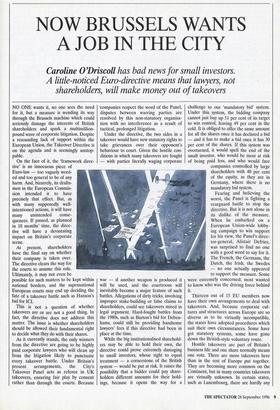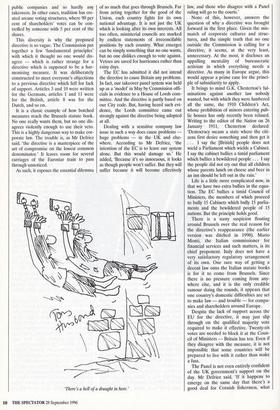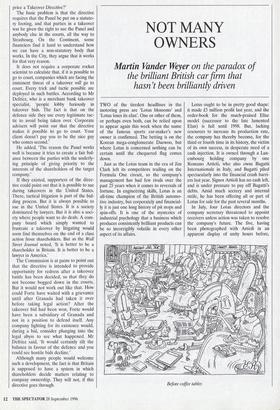NOW BRUSSELS WANTS A JOB IN THE CITY
Caroline O'Driscoll has bad news for small investors. A little-noticed Euro-directive means that lawyers, not shareholders, will make money out of takeovers
NO ONE wants it, no one sees the need for it, but a measure is wending its way through the Brussels machine which could seriously damage the interests of British shareholders and spark a multimillion- pound wave of corporate litigation. Despite a resounding lack of support within the European Union, the Takeover Directive is on the agenda and is seemingly unstop- pable.
On the face of it, the 'framework direc- tive' is an innocuous piece of Euro-law — too vaguely word- ed and too general to be of any harm. And, bizarrely, its drafts- men in the European Commis- sion intended it to have precisely that effect. But, as with many supposedly well- intentioned actions, it will have
many unintended conse- quences. If passed, as planned in 18 months' time, the direc- tive will have a devastating impact on Britain's corporate scene.
At present, shareholders have the final say on whether their company is taken over. The directive clears the way for the courts to assume this role. Ultimately, it may not even be possible for such matters to be kept within national borders, and the supranational European courts may end up deciding the fate of a takeover battle such as Hanson's bid for Ia.
This is not a question of whether takeovers are or are not a good thing. In fact, the directive does not address this matter. The issue is whether shareholders should be allowed their fundamental right to decide what they do with their shares.
As it currently stands, the only winners from the directive are going to be highly paid corporate lawyers who will clean up from the litigation likely to punctuate every takeover battle. Under Britain's present arrangements, the City's Takeover Panel acts as referee in UK takeovers, ensuring fair play by consent rather than through the courts. Because 'companies respect the word of the Panel, disputes between warring parties are resolved by this non-statutory organisa- tion with no interference as a result of tactical, prolonged litigation.
Under the directive, the two sides in a takeover would have new statutory rights to take grievances over their opponent's behaviour to court. Given the hostile con- ditions in which many takeovers are fought — with parties literally waging corporate war — if another weapon is produced it will be used, and the courtroom will inevitably become a major feature of such battles. Allegations of dirty tricks, involving improper stake-building or false claims to shareholders, could see takeovers mired in legal argument. Hard-fought battles from the 1980s, such as Burton's bid for Deben- hams, could still be providing handsome lawyers' fees if this directive had been in place at the time.
While the big institutionalised sharehold- ers may be able to hold their own, the directive could prove extremely damaging to small investors, whose right to equal treatment — a cornerstone of the British system — would be put at risk. It raises the possibility that a bidder could pay share- holders different amounts for their hold- ings, because it opens the way for a challenge to our 'mandatory bid' system. Under this system, the bidding company cannot just buy up 51 per cent of its target to win control, leaving 49 per cent in the cold. It is obliged to offer the same amount for all the shares once it has declared a bid — and it has to make a bid once it has 30 per cent of the shares. If this system was overturned, it would spell the end of the small investor, who would be most at risk of being paid less, and who would face companies controlled by large shareholders with 40 per cent of the equity, as they are in Germany, where there is no mandatory bid system.
Fearing and believing the worst, the Panel is fighting a rearguard battle to stop the directive. But it is not alone in its dislike of the measure. When he embarked on a European Union-wide lobby- ing campaign to win support for his view, the Panel's direc- tor-general, Alistair Defriez, was surprised to find no one with a good word to say for it. The French, the Germans, the Dutch, the Irish, the Swedes — no one actually appeared to support the measure. Some were extremely concerned; most wanted to know who was the driving force behind it.
Thirteen out of 15 EU members now have their own arrangements to deal with takeovers. And, because corporate cul- tures and structures across Europe are so diverse as to be virtually incompatible, the states have adopted procedures which suit their own circumstances. Some have got statutory systems, some have gone down the British-style voluntary route. Hostile takeovers are part of Britain's business life and one share normally means one vote. There are more takeovers here than in the rest of Europe put together. They are becoming more common on the Continent, but in many countries takeovers are virtually unknown. In certain states, such as Luxembourg, there are hardly any public companies and so hardly any takeovers. In other cases, tradition has cre- ated arcane voting structures, where 90 per cent of shareholders' votes can be con- trolled by someone with 5 per cent of the shares.
This diversity is why the proposed directive is so vague. The Commission put together a few 'fundamental principles' with which it thought no one would dis- agree — which is rather strange for a directive which is supposed to be a har- monising measure. It was deliberately constructed to meet everyone's objections to a previous directive which fell for lack of support. Articles 3 and 10 were written for the Germans, articles 1 and 11 were for the British, article 8 was for the Dutch, and so on.
It is a classic example of how botched measures reach the Brussels statute book. No one really wants them, but no one dis- agrees violently enough to use their veto. This is a highly dangerous way to make cor- porate law. The trouble is, as Mr Defriez said, 'the directive is a masterpiece of the art of compromise on the lowest common denominator.' It leaves room for several carriages of the Eurostar train to pass through unnoticed.
As such, it exposes the essential dilemma of so much that goes through Brussels. Far from acting together for the good of the Union, each country fights for its own national advantage. It is not just the UK which is looking after its own interests. All too often, ministerial councils are marked by endless statements of irreconcilable positions by each country. What emerges can be simply something that no one wants, but no one dislikes enough to vote against. Vetoes are saved for hurricanes rather than rainy days.
The EC has admitted it did not intend the directive to cause Britain any problems. In fact, our takeover panel system was held up as a 'model' in May by Commission offi- cials in evidence to a House of Lords com- mittee. And the directive is partly based on our City code. But, having heard such evi- dence, the Lords committee came out strongly against the directive being adopted at all.
Dealing with a sensitive company law issue in such a way does cause problems huge problems — in the UK and else- where. According to Mr Defriez, 'the intention of the EC is to leave our system alone. But this would damage us.' He added, 'Because it's so innocuous, it looks as though people won't suffer. But they will suffer because it will become effectively There's a hell of a draught in here.' law, and those who disagree with a Panel ruling will go to the courts.'
None of this, however, answers the question of why a directive was brought forward in the first place. Given the mis- match of corporate cultures and struc- tures, and the simple truth that no one outside the Commission is calling for a directive, it seems, at the very least, unnecessary. At the most, it discloses an appalling mentality of bureaucratic activism in which everything needs a directive. As many in Europe argue, this would appear a prime case for the princi- ple of subsidiarity to apply.
It brings to mind G.K. Chesterton's ful- minations against another law nobody wanted, but with which they were lumbered all the same, the 1910 Children's Act, whose prohibition of minors entering pub- lic houses has only recently been relaxed. Writing to the editor of the Nation on 26 January 1911, Chesterton declared: 'Democracy means a state where the citi- zens first desire something and then get it ... I say the [British] people does not wield a Parliament which wields a Cabinet. I say the cabinet bullies a timid parliament which bullies a bewildered people ... I say the people did not cry out that all children whose parents lunch on cheese and beer in an inn should be left out in the rain.'
Life is a little more complicated now, in that we have two extra bullies in the equa- tion. The EC bullies a timid Council of Ministers, the members of which proceed to bully 15 Cabinets which bully 15 parlia- ments and the bewildered people of 15 nations. But the principle holds good.
There is a nasty suspicion floating around Brussels over the real reason for the directive's reappearance (the earlier version was ditched in 1990). Mario Monti; the Italian commissioner for financial services and such matters, is its chief proponent. Italy does not have a very satisfactory regulatory arrangement of its own. One sure way of getting a decent law onto the Italian statute books is for it to come from Brussels. Since there is no pressure coming from any- where else, and it is the only credible rumour doing the rounds, it appears that one country's domestic difficulties are set to make law — and trouble — for compa- nies and shareholders around Europe. Despite the lack of support across the EU for the directive, it may just slip through on the qualified majority vote required to make it effective. Twenty-six votes are needed to block it at the Coun- cil of Ministers — Britain has ten. Even if they disagree with the measure, it is not impossible that some countries will be prepared to live with it rather than make a fuss.
The Panel is not even entirely confident of the UK government's support on the day. Mr Defriez said, 'If it happens to emerge on the same day that there's a good deal for Cornish fishermen, what price a Takeover Directive?'
The basic problem is that the directive requires that the Panel be put on a statuto- ry footing, and that parties in a takeover war be given the right to sue the Panel and anybody else in the courts, all the way to Strasbourg. On the Continent, some financiers find it hard to understand how we can have a non-statutory body that works. In the City, they argue that it works for that very reason.
It does not require a corporate rocket scientist to calculate that, if it is possible to go to court, companies which are facing the imminent threat of a takeover will go to court. Every trick and tactic possible are deployed in such battles. According to Mr Defriez, who is a merchant bank takeover specialist, 'people lobby furiously in takeover bids. The fact is that on the defence side they use every legitimate tac- tic to avoid being taken over. Corporate advisers will point out that the directive makes it possible to go to court. Your client doesn't pay you to be the nice guy who comes second.'
He added, 'The reason the Panel works well is because it tries to create a fair bal- ance between the parties with the underly- ing principle of giving priority to the interests of the shareholders of the target company.'
If they existed, supporters of the direc- tive could point out that it is possible to sue during takeovers in the United States. .There, tactical litigation is part of the bid- ding process. But it is always possible to sue in the United States. It is a society dominated by lawyers. But it is also a soci- ety where people want to do deals. A com- pany board which simply wanted to frustrate a takeover by litigating would soon find themselves on the end of a class action from shareholders. But as the Wall Street Journal noted, 'It is better to be a shareholder in Britain. It is better to be a lawyer in America.'
The Commission is at pains to point out that the directive is intended to provide opportunity for redress after a takeover battle has been decided, so that they do not become bogged down in the courts. But it would not work out like that. How could Forte have waited with a grievance until after Granada had taken it over before taking legal action? After the takeover bid had been won, Forte would have been a subsidiary of Granada and not in a position to defend itself. Any company fighting for its existence would, during a bid, consider plunging into the legal abyss to see what happened. Mr Defriez said, 'It would certainly tilt the balance in favour of the defence and you could see hostile bids decline.'
Although many people would welcome such a development, the fact is that Britain is supposed to have a system in which shareholders decide matters relating to company ownership. They will not, if this directive goes through.




















































































 Previous page
Previous page